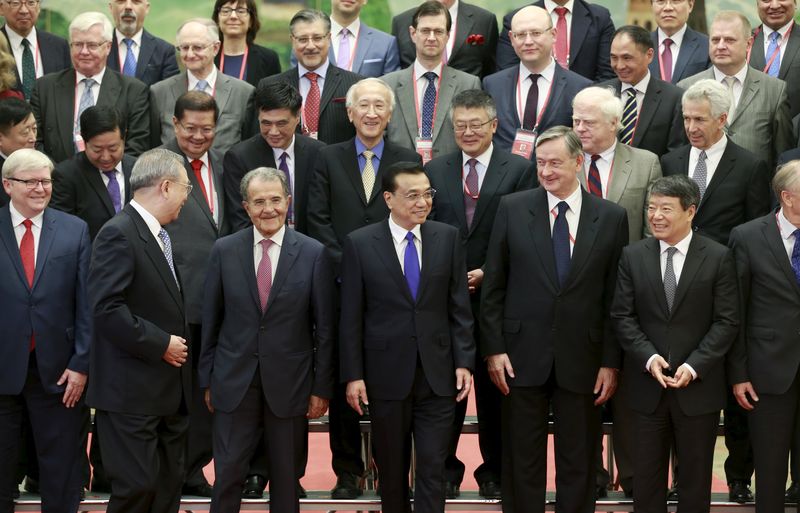By Robin Emmott and Barbara Lewis
BRUSSELS (Reuters) - The European Union will briefly put aside worries about Greece to broaden its relations with China at a summit in Brussels on Monday, hoping for Chinese investment in Europe's new infrastructure fund and support for a global climate deal.
As China seeks to move Sino-European ties beyond trade and win a bigger role in international affairs, the European Union is relieved to find a more cooperative partner, agreeing to play down tensions that have bedevilled relations in the past.
"This meeting will send a positive signal that China and the EU can push growth through reform and innovation," said Chinese Deputy Commerce Minister Wang Shouwen before the first summit between China's premier, Li Keqiang, and the new heads of the European Commission, Jean-Claude Juncker, and the European Council of EU leaders, Donald Tusk.
An expected multi-billion euro pledge by Beijing to invest in European telecoms infrastructure, reported first by Reuters earlier this month, is the most concrete sign that trade disputes and issues about China's human rights are no longer dividing Brussels and Beijing at the highest level.
While the amount is still to be decided, the pledge will mark the latest step in China's efforts to shape global economic governance and follows decisions by major EU governments to join the Chinese-led Asian Infrastructure Investment Bank (AIIB) in defiance of Washington.
Underscoring the change in tone, China's Li may hold a news conference at the EU summit, diplomats said.
In the past, the unwillingness of senior Chinese officials to hold news conferences following high-level meetings in Brussels was a source of conflict because the European Union prides itself on its openness to the media.
Monday's summit is also expected to be the occasion for China to boost its environmental credentials and voice solidarity with the European Union's push for a new global deal on climate change at U.N. talks late this year hosted by France.
China, the world's biggest polluter, has shifted its stance since the U.N. summit of 2009, the last attempt to reach a climate deal, as it faces social unrest because of pollution.
Beijing had said it will submit its plans for emissions reduction to the United Nations in the first half of this year. People familiar with the issue in both China and the European Union say Monday could be the day Beijing chooses, although it is unclear if the announcement will be made in Brussels.
TRADE TENSIONS STILL LURK
China, responsible for around 25 percent of all greenhouse gas emissions, has already said its emissions will peak "around 2030, with the intention to try to peak early". Diplomats have said China could also announce a new target for the carbon intensity of its economy for 2030.
Jos Delbeke, director general of the European Commission's climate department, said the significance of a formal Chinese pledge to the United Nations would be that "we are going to see more than half of the emissions in the world covered".
There are still trade tensions, however, as many in Europe refuse to see China as anything but a state-led and subsidised economy. That sets up a dispute next year over Beijing's bid to win a different status at the World Trade Organisation that would make it harder for Europe to protect local industry.
The WTO recognised when Communist China joined the trade body in 2001 that its local prices are not set by market forces but expected that 15 years after the date of accession, Beijing would play less of a role in directing the economy.

"China is considered in the WTO setting as a developing country and at the same time, wants market economy status," said Italy's deputy economy minister Carlo Calenda, who is responsible for trade. "It is clear that it is not a market economy. So what are we debating?"